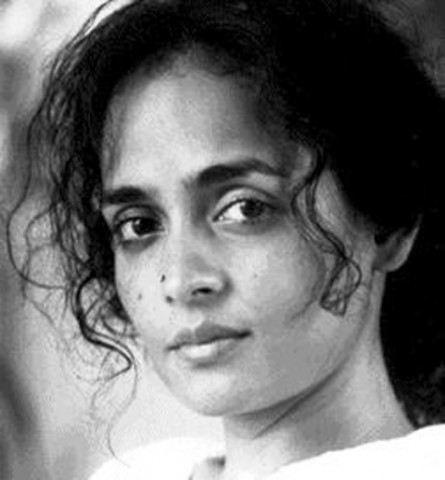Arundhati Roy’s saga in India sometimes reminds me of ancient Athens and its ruling class. One example is the way the Indian ruling class, major opposition party and the mainstream media reacted to Roy’s comments questioning India’s right over Kashmir and calling for it's independence.
If one takes the statement at face value, it appears to be a regular comment that many groups in the Kashmir valley make every day. Such questions are also raised in many seminars in Delhi and other parts of India, but this freedom of speech, which is basic to the functioning of a democracy, is being termed as seditious.
Indian Law Minister M Veerappa Moily termed the statement "most unfortunate" and warned that freedom of speech “cannot violate patriotic sentiments of the people.”
The main opposition party, the Bharatiya Janata Party (BJP), called it anti-national, branded it seditious and “blamed the government for looking other way.”
How far is invoking patriotism justified for booking a writer or artist on charges of sedition?
The 18th century English writer, Samuel Johnson, called “patriotism…the last refuge of the scoundrel.” In the 21st century, ‘nationalism’ has replaced the word ‘patriotism’. So-called political groups who call themselves nationalists try to stifle any voice of dissent which does not agree with the narrow world view of such parties, who claim to represent a democratic India which gives a constitutional guarantee to freedom of speech.
Pity the nation that has to silence its writers for speaking their minds...Pity the nation that needs to jail those who ask for justice while communal killers, mass murderers, corporate scamsters, looters, rapists, and those who prey on the poorest of the poor, roam free.
This was the reaction of Arundhati Roy to those who demand a trial against her. This is a scathing commentary on the state of the nation and the thinking of the ruling class of modern India. Instead of showing maturity as a democracy, we are showing impatience with the finer points of democratic values.
This is not the first time India is failing its democratic values. Recently in Mumbai University, Rohinton Mistry’s novel, “Such A Long Journey,” was banned because it has some derogatory reference to the rabid Hindu party, Shiv Sena. The so called liberal party, the Congress Party, which is running the government in Maharashtra, failed to come in to rescue the liberal voices in the university and outside.
We did not come clean when the Bangladeshi writer, Taslima Nasreen, was attacked in India. Our most famous painter, MF Hussein, had to take citizenship in another country in desperation, because we failed to secure his artistic freedom.
What is worrying is the role of media in the whole affair. Look at the way the mainstream media went berserk after Arundhati Roy’s speech in a seminar in Delhi. The media, instead of playing a constructive role and putting things in context, tried to inflame public sentiment. It seems to be abdicating its role as an independent observer and informer and is acting in tandem with the government and establishment-and this in the name of national interest!
The general perception is that the media played a negative role in inflaming passion against Roy. Even Roy was aghast when she saw the presence of a TV van when workers of the Bharatiya Janata Party ransacked her house, and she blamed the media for the shady deed.
Celebrated intellectual Noam Chomsky, in a recent interview with Outlook magazine, has called the Indian media less free than it is generally made out to be. He finds the media in Pakistan more independent and fearless in reporting than in the largest democracy in the world.
At the time when Roy was being attacked in India, Pakistan, which is largely seen as country without any real democracy, was making history by choosing Asma Jehangir, a firebrand civil rights activist and one of the rebels of the Pakistani establishment, as the chief of the Supreme Court Bar Association. India, despite being the world’s largest democracy, looks hypocritical and shallow in its reaction to people like Roy. Is democracy all about election at the right time and political sloganeering? Democracy is much more than that.
As India is growing as a nation and trying to register its presence on the international stage, it is forgetting some of the basic strengths that brought this country this far and distinguished it as a as a grassroots democracy.
Ashis Nandy, a social scientist, in a recent article in Outlook magazine, explained this new, growing phenomenon of intolerance towards dissent as a byproduct of economic liberalisation and the emergence of a new middle class. He wrote:
This new middle class wants to give meaning to their hollow life through a violent, nineteenth-century version of European-style ‘nationalism’. They want to prove—to others as well as to themselves—that they have a stake in the system, that they have arrived. They are afraid that the slightest erosion in the legitimacy of their particularly nasty version of nationalism will jeopardise their new-found social status and political clout. They are willing to fight to the last Indian for the glory of Mother India as long as they themselves are not conscripted to do so and they can see, safely and comfortably in their drawing rooms, Indian nationalism unfolding the way a violent Bombay film unfolds on their television screens.
Whatever the reason and explanation for the growing intolerance, some of the questions raised by Arundhati Roy and people like her need an answer, not suppression. Athenians killed Socrates, but his questions kept on haunting the ruling class. By punishing Roy, we can’t close the issues and ideas she has raised. For a more democratic India and for a more humane future for Indians, we need answers and responses to those questions raised in the seminar in New Delhi.



COMMENTS
Comments are moderated and generally will be posted if they are on-topic and not abusive.
For more information, please see our Comments FAQ